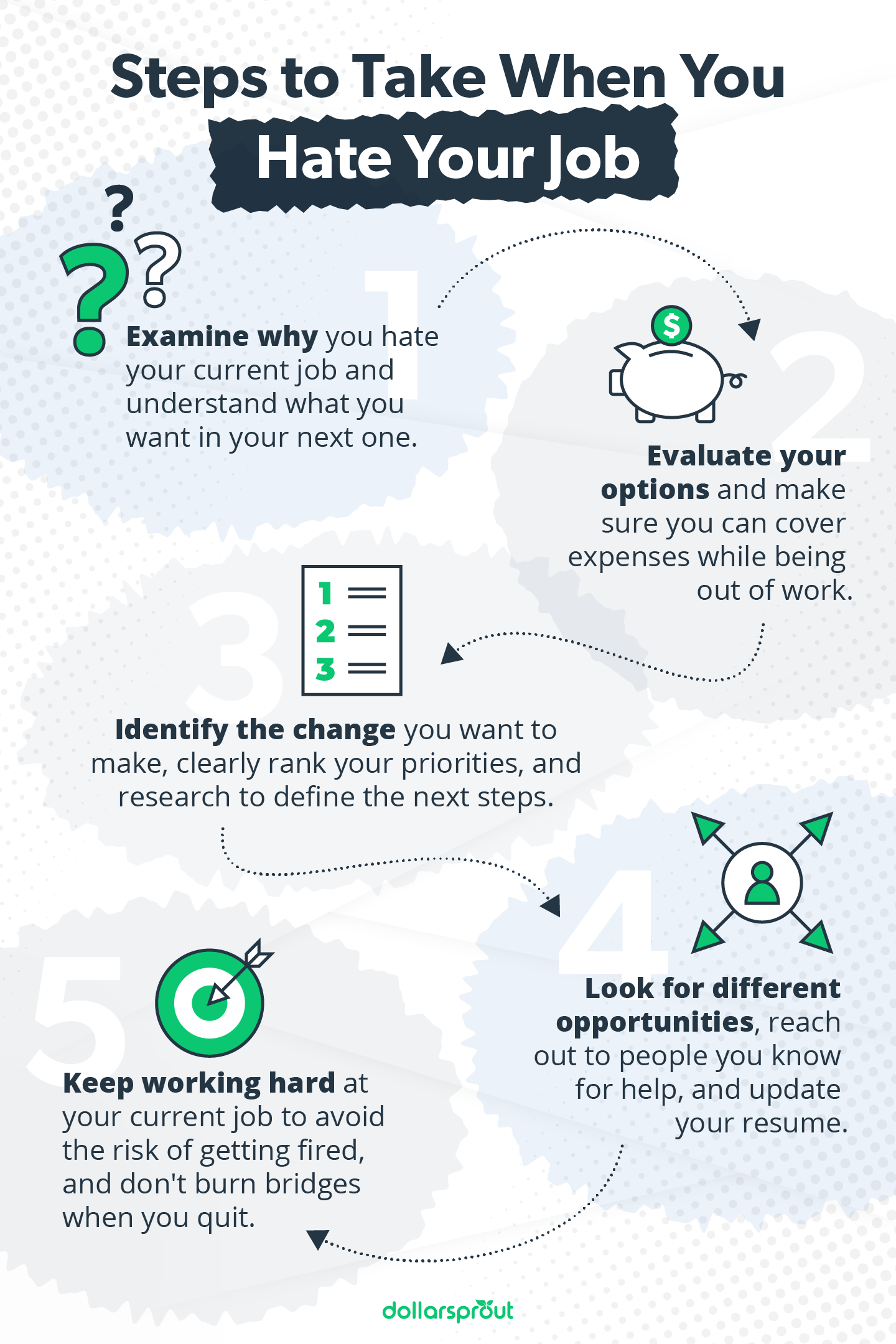Hate Your Job and Want to Quit? 5 Tips for Planning an Exit
Our readers always come first
The content on DollarSprout includes links to our advertising partners. When you read our content and click on one of our partners’ links, and then decide to complete an offer — whether it’s downloading an app, opening an account, or some other action — we may earn a commission from that advertiser, at no extra cost to you.
Our ultimate goal is to educate and inform, not lure you into signing up for certain offers. Compensation from our partners may impact what products we cover and where they appear on the site, but does not have any impact on the objectivity of our reviews or advice.
Quitting your job should be taken seriously. If you do it wrong, it could affect your ability to get another job. But if you do professionally, then you can seamlessly move from one job to another, even in the same field.

Our mission at DollarSprout is to help readers improve their financial lives, and we regularly partner with companies that share that same vision. If a purchase or signup is made through one of our Partners’ links, we may receive compensation for the referral. Learn more here.
I hated my first job out of college.
I was working as a newspaper reporter in a small town where I didn’t know anyone. My workday lasted from 2 to 10 p.m., which left little time to hang out with people. My boyfriend lived in a different city three hours away, and I quickly realized that newspaper life wasn’t for me.
I complained about my job constantly. People told me I should quit and find something else, but I couldn’t afford to quit without a back-up plan, and because the country was still recovering from the Great Recession, it was hard to find a job.
5 Steps to Take When You Hate Your Job
Finally, I was able to land something else that was a better fit. I was able to quit gracefully and stay on good terms with my bosses. But the experience taught me a lot about what to do when you hate your job and want to quit.
1. Examine why you hate your job.
When I wanted to quit my newspaper job, I knew that I wanted to leave the industry entirely. While some of my complaints were directly tied to the city and my assignment, most of my problems were with the industry as a whole.
If you hate your job, you have to sit down and figure out what exactly you hate about it. Is it a lack of autonomy? The hour-long commute? A lack of flexibility? Knowing what you don’t like can prevent you from choosing a job with the same qualities.
When I decided I wanted to quit, I made a list of what I didn’t like about this job. For instance, I hated working on weekends and holidays, and I also wanted better benefits like a 401(k) and more paid vacation days. I didn’t want to work in a high-pressure environment that jobs in journalism offer.
Understanding why you don’t like your job is crucial to helping you figure out what you want in your next one. It’ll help prevent you from settling and being just as unhappy in your new position.
Related: Make Your Resume Stand Out With These 11 Extracurricular Activities
2. Evaluate your options.
Take a look at your budget if you’re considering handing in your resignation letter without another job lined up. You need to make sure that you can afford to be out of work and address any spending changes you may need to make until you find something else.
First, look at your total savings and emergency fund. Since most people in America can’t cover a $400 emergency, you need to evaluate if you can swing being unemployed for a certain period of time. It takes the average person about five months to find a new job, according to the Bureau of Labor Statistics. Make sure you have enough money to cover your bills and any emergencies that might arise during that time.
Write out a list of all your necessary expenses, including groceries, debt payments, transportation, utilities, and anything else you need to pay for. See what you can get rid of if you quit your job. You might need to pause any subscriptions, memberships, and other entertainment expenses. If you live alone and can get out of your lease and move in with a friend or significant other, that could have a substantial impact on your budget.
You should also brainstorm to see if you can work somewhere else or start a side hustle while you’re job hunting. When I wanted to quit my job, my boyfriend suggested I get a part-time gig at Starbucks to cover the bills while I looked for something else. I considered this option, but then realized I wouldn’t be able to afford my student loan payments on a Starbucks barista’s income.
As much as it hurt, I had to keep working even though I was miserable and my mental health was suffering. But I knew that going further into debt wouldn’t make me feel better if I quit my job.
Even if you can afford to quit financially, you should consider how quitting will look on your resume. If your resume shows that you don’t stay longer than a year or two, then future employers might assume you lack commitment.
Related: When is it OK to Take a Pay Cut for a New Job?
3. Identify the change you want to make.
Before you start looking at new jobs, take some time to really consider what you want to do. If you’ve been in your field for a while and like what you do but find your current situation toxic, then finding a similar job somewhere else might be the best choice. But if you’re feeling confused and aren’t sure that you want to stay in your field, it may be time to consider going back to school, starting a business, or switching industries entirely.
When I was a newspaper reporter, I realized how much I hated working nights, weekends, and holidays. Suddenly, being able to spend time with my boyfriend for Christmas and his birthday meant more than working for a newspaper. When I looked for a new position, I made sure it had paid holidays and weekends off.
Make a list of what you’re looking for and rank your priorities. Then create a separate list of what you’ve enjoyed about previous jobs and companies. You should also write down any careers or fields you’re interested in.
For example, if you’ve always loved to draw or paint, maybe a career in graphic design would be interesting. If you love working with kids, teaching could be your next move. Write down anything that you’ve always found fascinating or interesting — no matter how irrelevant it may seem.
Then do some internet research or talk to a career counselor about what you’re interested in. Call a university with a degree program and see if you can talk to someone there.
Related: How to Change Careers Smoothly in 6 Simple Steps
4. Work your plan.
The first thing I did when I decided I wanted a new job was to start emailing everyone I knew. I told them that I was looking for a different opportunity and asked if they knew of anything.
It was one of these connections that told me about a special newsletter that went out to people interested in the non-profit community, so I signed up for it. It turned out to be a wise choice because that newsletter was where I found the announcement about the opening for my next job.
When you reach out to people, simply mention that you’re looking for a different opportunity. You don’t want to be dramatic or coy, and you don’t need to go into all the reasons you’re unhappy. That could prevent them from recommending you or sending you opportunities.
But if you’re professional about it, they’re more likely to help. And if someone sends a useful tip or hint, consider responding with a hand-written note or gift card to Starbucks or Amazon.
Updating your social media profiles is also important. First, make sure that any personal profiles, like your Facebook page, are set to private. Many companies will comb through social media to see if there’s anything incriminating on there, and for many companies, what you share can be a dealbreaker.
Update your resume or LinkedIn profile with your current job and refresh it with any significant accomplishments. For example, if you won an award or learned a new skill, make sure it’s on your resume. You should also update your references if they’re out of date.
It may also be helpful to contact your references and confirm they still want to provide a recommendation for you. Before you send out your resume, make sure you proofread and check it for any errors; you don’t want a simple mistake to prevent you from getting a job you really want.
Depending on what you do, creating a website portfolio could help you land a gig. This may not be applicable if you’re a nurse, but it may be useful if you’re a writer, graphic designer, or marketing consultant.
Related: How to Quit Your Job the Right Way
5. Keep working hard at your current job.

When I wanted to quit my job, it was hard to stay motivated. I found myself not caring and feeling completely depressed. But my boss noticed. One day, he called me into his office and asked if I still wanted to work there. He said I seemed very disinterested in the last company meeting.
That’s when I realized that I had to put in more effort. I didn’t want to risk getting fired. I still needed the job to cover my bills, especially my student loan payments.
As difficult as it is, you still have to work hard even if you hate your job and want to quit. This is doubly true if you’re staying in the same field or in the same city and you might run into your current boss after you leave.
It’s also important not to burn bridges even after you leave, especially if you’re at the beginning of your career. When I quit my newspaper job, I had to schedule an exit interview with the HR department. The exit interview was a chance for me to share any concerns or complaints I had. I was so excited.
But then I spoke to a former internship editor who said not to be honest during my exit interview. He said that anything I said would be shared with my bosses who could use it to retaliate against me in the future, like if someone called them for a reference.
“I know you want to be honest, but the best thing is to be polite,” he said.
I was disappointed. There were many legitimate complaints I had, but I kept quiet. Now, years later, I’m glad I did. The world is a small place, and you never know where a former boss might end up.
Related: How to Ask for a Raise
Treat Quitting as Seriously as You Take Finding a Job
Everyone loves a good quitting story, like the one about the flight attendant who quit his job by deploying the emergency slide. A story that goes viral may seem fun, but it’s usually a bad career move.
Even when you hate your job, quitting should be taken seriously. If you do it wrong, it could affect your ability to get another job. But if you are professional about it, then you can seamlessly move from one job to another, even in the same field.








